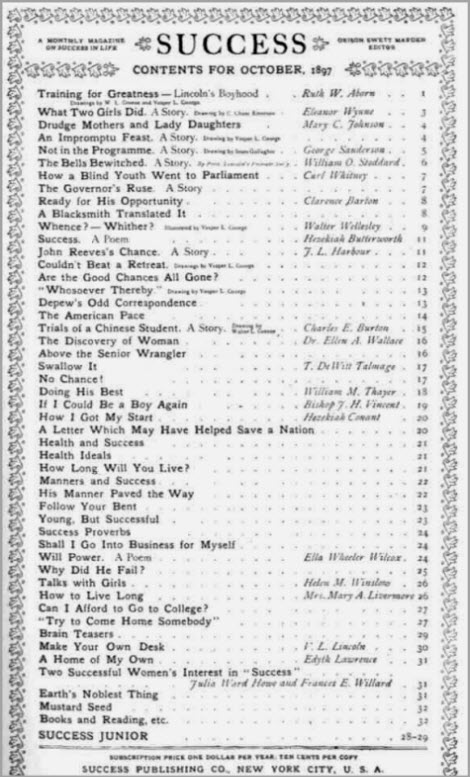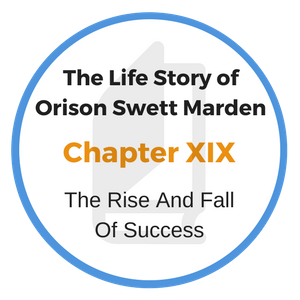- Home
- Self Growth Library
- Orison Swett Marden Chapter XVIII
Orison Swett Marden Chapter XVIII
The Founding Of 'Success Magazine'
The Life Story of Orison Swett Marden Chapter XVIII:
How can I reach the largest number of people to give them a new philosophy of life?" Marden asked himself.
This was in the autumn of 1897, when the success of his first book was assured. He had turned his hand definitely to authorship, but he felt that the occasional publication of a book would not enable him to reach the audience that he wanted to reach. Wherefore he pondered:
"How can I bring a million or two million people together in a common cause?”
Doctor Marden's name has been so constantly linked up with the word "success" that it would be well to explain just what he meant by success in life.
While he believed that the material things were desirable, he constantly advocated the development of man's powers, mentally and spiritually as well. Only the full-rounded individual could be really termed successful. From the standpoint of the physician as well as the philosopher, he most firmly believed that the world's ills and worries and misfortunes were more than ninety percent mental.
He felt, therefore, that the greatest service he could render humanity was to give it encouragement, confidence in itself, assurance of its own power — and more than all else, its power to conquer the most potent and insidious enemy that ever attacked the human race — FEAR.
He further believed that the greatest instrument yet devised for reaching the world is the printing press. "I decided to build an institution founded on the printing press," he said. "Its voice should be the magazine which I proposed to establish. This magazine would go out into the homes of the nation, carrying its message of good cheer, extending the hand of fellowship, and reassuring one of the power within himself, the limitless possibilities in every human being. Its purpose would be not only to foster success in business, but to make successful homes, successful families, and successful people."
At another time he said, "The demand for my book, 'Pushing to the Front', was the immediate origin of Success Magazine. I had received so many letters from all sorts of people, old and young, telling of the encouragement and inspiration they had received from it, that it gave birth to the new idea."
"The more I thought of it, the more convinced I became that such a magazine was needed. But how could a man start a magazine, not merely without money, but in addition, with a tremendous debt hanging over him?"
"While working on my manuscripts in Boston I had been obliged to part with my books. I had carried a few at a time to a second-hand bookstore and bartered them for others, which I felt that I must have. Some were sold outright for the money, which I needed even more for food than for books."
"In spite of the gratifying success of 'Pushing to the Front' and the publication of my second book, 'Architects of Fate', there was no immediate prospect of ready money. I had been very anxious to control the plates of 'Pushing to the Front', and had finally made arrangements with my publishers to pay for them when I was able. Already I had paid nearly eight hundred dollars on the plates, so that the royalties from the two books still left me but a small income on which to live and meet a great many thousands of dollars of pressing indebtedness."
"The outlook was not promising, but I made up my mind to start this, the first inspirational magazine in the world. An Old World proverb says, 'Get thy spindle and thy staff ready and God will send the flax.' Without capital, the only thing that could be done toward starting this magazine was to get a suitable name for it."
"That was not very easy, for I wanted one that would attract attention and yet be a real index to its purpose and reason for existence. After much consideration of the relative merits of a lengthy list of possibilities, the choice was reduced to two — Success, or Success in Life."
"There is something greater than wealth, grander even than fame. Manhood and character stand for success - nothing else really does."
- O.S. Marden
"I came very near adopting the latter, but there was a legitimate objection to it, for it seemed too closely associated with the mere money-making idea. There was no such objection, in my mind, to the word Success. Besides being a shorter and more striking name, it was really one of the grandest words in the English language. To me it meant the unfolding, the flowering and fruitage of the finest and noblest qualities in human nature."
"What if people did abuse and misinterpret this grand word? What if they did make hideous caricatures of its real meaning? Despite these objections, it should not be condemned. The name, though subsequently criticized by high-minded men and women as being too mercenary, fitted the sort of magazine I had in mind. That is, it was to be a publication which should stand for the only real success in life, — the complete development of the man, of the woman, that God made, for service to mankind, and for making a life as well as making a living."
"My idea was that the magazine should be based on the principle that spiritual success is simply a proper part of success as the world uses the word, — that the two complementary triumphs are the best all-round definition, — and so I decided to name it Success.
"That question settled, the plan and scope of the magazine had to be worked out. In discussing these I had the invaluable help of my friend Arthur W. Brown, of Providence, Rhode Island."
"Achievement is not always success, while reputed failure often is. It is honest endeavor, persistent effort to do the best possible under any and all circumstances."
- Orison Swett Marden
Orison Swett Marden Chapter XVIII , continued...
"Soon after I first went to Block Island, I made the acquaintance of Brown, a man of the highest character and most remarkable ability. There was much that was common to us both in our ambitions and ideals, and he gave me most valuable assistance in developing the Success idea and in founding the publication. Although my friend's business was in Providence, he frequently came to Boston to see me, often staying overnight to hash out our plans for the future magazine."
"We soon found that to plan an enterprise is one thing; but to get capital to start it is another and quite a different thing. When our plans were well matured, no one seemed eager to put up money to carry them out. After many attempts to interest Boston capitalists in the Success idea, I failed to get any response, chiefly on the grounds that none of those to whom I had appealed believed in the practicability of the idea. In fact, they all seemed to think there was nothing in it."
"This was bitterly disappointing, but it did not weaken my faith. Although my debts were very troublesome at the time, my purpose remained unshaken, and I kept hammering away for its realization."
"After two years of vain effort to secure the necessary backing, there came a letter from Louis Klopsch, publisher of the Christian Herald, New York, asking if I would write a premium book for his publication on the subject, 'How to Succeed.' This was a veritable godsend. Of course I accepted the commission, and, on the completion of the book, went to New York to try to interest Klopsch in my Success idea."
"At first he declined to assist me, but advised me, instead of trying to get out a magazine of my own, to join Irving Bacheller, the novelist, who was about to start a paper for young people, to be called Youth and Home. Klopsch arranged a meeting between Bacheller and myself, but nothing came of this, for I decided that a combination of our ideas was not reasonable."
"After our failed meeting I again endeavored to interest Klopsch in my own project, but he still refused to consider it. Determined, however, not to drop the matter, I kept up a continual fire of correspondence and interviews, until he finally telegraphed me to visit him at his summer home in Nyack, New York, where I spent a delightful week."
"Having thoroughly discussed the possibilities of Success, the question of ways and means, and other important details, we at last came to an agreement by which Klopsch was to become a partner in the enterprise, he to put his capital and publishing facilities against my ideas. Before completing the agreement, however, and to prove that my ideas were practicable, he stipulated that I should return to Boston and publish the first edition of Success without any suggestions from him. He insisted upon this, although, the preceding October, I had issued a sample edition, beautifully printed by Carl Heintzmann, of Boston, and Brown had sent a sample copy to the president of every business college in the United States and many classical institutions."
"We then incorporated under the name of 'The Success Company,' the stock to be divided equally between us. A little later, Klopsch told me that his attorney had advised him that it would not be safe to divide the stock equally, because, if any serious difference should ever arise between us, we might come to a standstill, neither having control. He suggested that he should have the controlling share, to which I agreed."
"After our contract was completed, we hired a room in Cooper Union, New York City, Klopsch believing that the name and purpose of that institution would accord well with the Success idea, and that the magazine would derive great advantage from the association."
"Cooper Union Institute, was founded by Peter Cooper, once a poor boy who, through sheer industry, had worked his way up to the position of a wealthy manufacturer. Having been denied the ordinary school privileges of more fortunate children, he tried to find some evening school in which he could obtain help in his studies evenings, while working at his trade by day. Not being able to find any such school in New York — that was more than a century ago — young Cooper said to himself, 'If ever I prosper in business so as to acquire more property than I need, I will try to found an institution in the City of New York, wherein apprentice boys and young mechanics shall have a chance to get knowledge in the evening.'"
"When some half a century later he was in a position to make good his promise, he found that evening schools had been established in every ward of New York. What should he do?"
"He felt that the greatest service he could render humanity was to give it encouragement, confidence in itself, assurance of its own power — and more than all else, its power to conquer the most potent and insidious enemy that ever attacked the human race — FEAR."
He was in doubt until he heard of the Polytechnic School of Paris. His plan was at once formed. Cooper Union, modeled on the Paris Polytechnic, was built and endowed, and given as a free gift to his native city. Since then many thousands of young men and young women have found within the doors of Cooper Union an education far beyond what young Peter vainly sought in the days of his struggling apprenticeship."
"When Cooper Union was founded, there were doubtless open spaces all around it. New York has multiplied since and enlarged itself many times; and, when Success made its headquarters in Cooper Union, it found itself on the outer edge of the crowded East Side section known as the Bowery. Our little room, which was under the shadow of the Third Avenue elevated Railroad, but had but one window, and was so dark that we had to work mostly by artificial light. Moreover, the perpetual noice from trains rushing by every moment and from the heavy traffic in the streets, was not conducive to concentration, and added considerably to the difficulties of mental work."
"With the assistance of my friend Brown, I had the first issue of Success printed in Boston as agreed. This was in 1898, and the Boston publication was continued. Thereafter, for two years, I traveled between Boston and New York, spending two days each week in New York. To save time and expense, the journey was made by Fall River boat at night, starting from either terminal at about five o'clock in the evening and arriving at the other at seven or eight in the morning."

"During this time most of my editorial work was done in a little back room in a Boston boarding house at Number 43 Bowdoin Street. This room had to serve as bedroom and editorial office, — and partly owing to this arrangement, it was impossible for me to employ a stenographer. After a little time, however, I was fortunate enough to get a sofa bed, which made it possible for me to receive callers, and give my office a more business-like aspect."
"George H. Sandison, then editor of the Christian Herald, was my collaborator at the New York end, aiding me greatly in securing contributors there and getting acquainted generally with the literary community of the metropolis. He was a born editor, and rendered me most valuable assistance in these ways and with his advice in the selection and shaping of articles for the magazine during the first two years of its existence. Brown edited our manuscripts and took charge of the proof."
"So much traveling between the two cities, however, especially at night, made my editorial work very hard, and it became absolutely necessary for me to move to New York. Accordingly, in the beginning of February, 1900, with mingled feelings of regret and relief, I severed the associations of many years in Boston and thenceforth the home of Success was in New York City."






